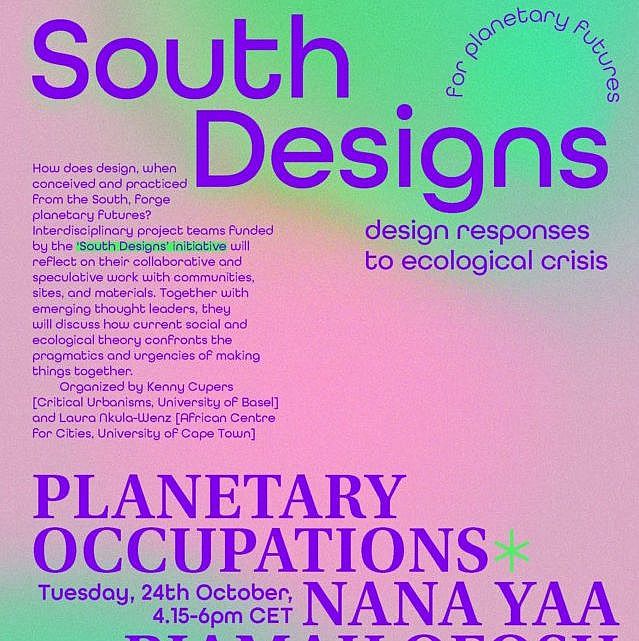STUDENT REFLECTIONS ON THE PUBLIC CONVERSATION WITH SURAYA SCHEBA AND NANA YAA BIAMAH OFOSU

Fabian Konopka, Fay McKee, Nadja Nievergelt, Oliver Frayne | 2023
Within the framework of the public conversation series South Designs: Planetary Futures, which explores how design, thought and practiced from the South, forges planetary futures, students from Critical Urbanisms are asked to share their reflections on the respective conversation and how each speaker answers to the question; What do design responses to ecological crisis look like when they are grounded in the aspirations and struggles of those most affected, predominantly residing in the Global South? Four reflections from students on the public conversation with Suraya Scheba and Nana Yaa Biamah Ofosu, focusing on occupations as forms of design in response to systemic injustice, have been selected to be published.
Fabian Konopka suggests thinking occupation towards a “more-than-human” practice in order to ask; “Who else could occupations of the (urban) landscape address rather than its human inhabitants and why is this important to think counter-hegemonic design as transgressive and imaginative struggles not only against neoliberal specifics of dominance but particularly to understand the very present of coloniality within those specifics of dominance?”
Fay McKee links the presented concepts of urban occupancy to her observations of the student housing cooperative “Stucco Housing Coop” in Sydney and states that “[b]y bringing their student co-operative housing project to fruition in a rapidly gentrifying neighbourhood like Newtown, and by offering low-income people the chance to own a property, the committee behind Stucco transgressed the standard notion of ownership.”
Along two distinct occupations, Cape Town‘s Cissie Gool House and Zurich‘s Kochareal, Nadja Nievergelt “delve[s] into the underlying motivations and trajectories of these occupations that diverge considerably as well as spotlighting lessons the planners and architects of the city of Zurich could have learned from Cissie Gool House‘s ethos” and asks: “What’s Radical Love got to do with it?”
Oliver Frayne “reflects on the entanglement of th[e] physical and psychological act of reparation through occupation, and its undergirding socio-political context. Exploring that “[o]ccupation threads together the physiological – the subsistence, the existence – with the psychological, the cultural, the community”, he states that “[t]he act of occupation centers notions of humanity in design.”
Quick Links
